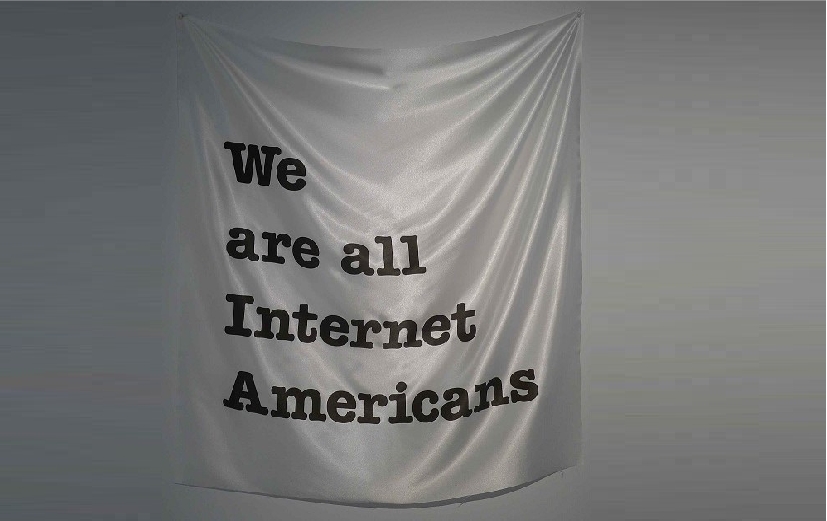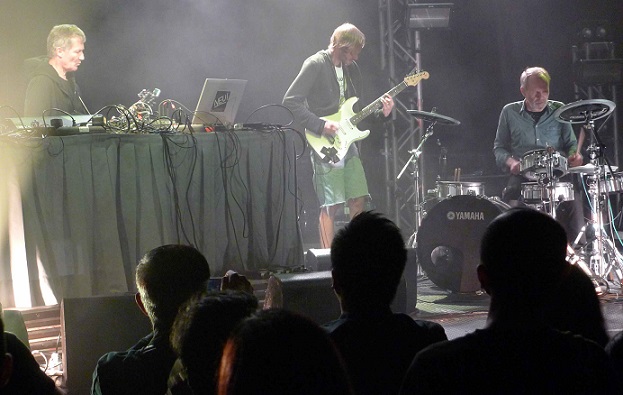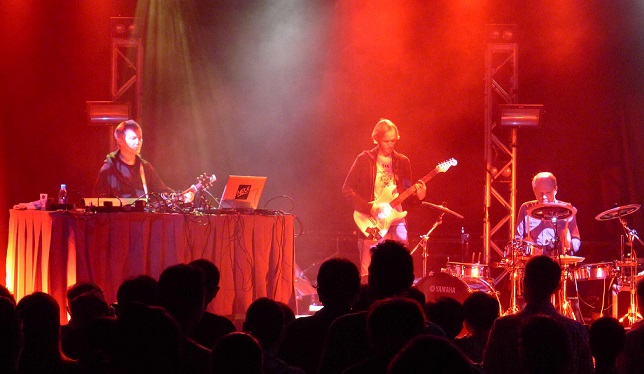Reviews & Articles
「我們都(只是)互聯網美國人」?∣ “Are We All (Just) Internet Americans”?
John BATTEN
at 11:49am on 16th November 2016



Captions:
1. Lam Hoi Sin, 'We Are All Internet Americans', printed words on cotton, 2015 圖片說明:林愷倩《我們都是網絡美國人》,印字棉布, 2015
2. - 3. Michael Rother (of Neu!, Harmonia) concert at KITEC, Hong Kong, 8 November 2016 - playing with Hans Lampe (of La Düsseldorf) and Franz Bargmann (of Camera)
(Please scroll down for English version)
卜戴倫 (Bob Dylan)榮獲本屆諾貝爾文學獎,聚光燈也照在「詩意」音樂上。戴倫不是首位會寫歌的得獎人,1913年首位獲得亞洲諾貝爾的亞洲得主,來自孟加拉、學識淵博的作家、音樂家、藝術家和教育家泰戈爾(Rabindranath Tagore),筆下歌曲作品也數以千計。此前有說戴倫可能獲諾貝爾獎,但有人認為只是嘩眾取寵的猜測,而非認真的建議。容許我借用戴倫的歌詞來說說現在的世情:不僅是「a-changing」(將要改變),而是正面受干擾。我們都知道,因為有了互聯網,世界的距離縮短了、各國文化流動性大了,也不再受國界所限,形形色色的意念、音樂和文學也可以公諸同好。而谷歌的翻譯功能Google Translate更似乎可以令不同語言之間互相明白。
因此,在這個跨文化欣賞的時代,把文學獎頒予美國男性白人創作歌手便似乎流於保守。為什麼不是來自非洲、中東或亞洲的作曲家?明顯的解釋,就是自上世紀二、三十年代,差利.卓別靈和荷李活片廠製作技術最先進、娛樂性最高的電影以來,美國流行文化便已產生了全球性的影響。美國人在電影的市場推廣和發行上的專業知識,也延伸到環球唱片業、電視、音樂錄像,還有現時最新的電腦和智能電話科技上。儘管最近受到一些干擾,美國的文化、經濟政策和地緣政治繼續成為主導。香港藝術家林愷倩最近在其橫幅作品中,便以「我們都是網絡美國人」(We Are All Internet Americans)正確地反映了這項事實,精準地寫出了為什麼我們會那麼親密地知道關於希拉利、特朗普和近期美國總統大選的新聞。
同樣的,卜戴倫的音樂50年來也風行全球。戴倫的長青與成功也來自他把其他詩人、作曲家和音樂家的創作融入自己作品的能力;這是人所共知的。戴倫自己也這樣說;他解釋說《眼帶憂傷的羅蘭茲女子》(Sad Eyed Lady of the Lowlands)是「舊時代的宗教嘉年華音樂」。1975年我還在上中學的時候,我的英文老師很有創意,他在課堂上播放了戴倫的《暴雨將至》(A Hard Rain’s a-Gonna Fall)和傳統英國/蘇格蘭民謠《蘭德爾王》(Lord Randall),說明戴倫著名反核戰歌曲的結構和節奏完全套用了一首古老民謠。正如馬田史高西斯的傑出紀錄片《卜戴倫漂流半生》的刻劃所見,年青的戴倫殷勤地搜羅美國、愛爾蘭、蘇格蘭、英格蘭和非洲美國人的傳統民歌、藍調、鄉村音樂和草根音樂。他兼收並蓄,融入了各種各樣的歌唱影響,包括Woody Guthrie、Willie Dixon、Liam Clancy、Tommy Makem、Odetta、John Lee Hooker和Hank Williams。
諾貝爾評委非常小心,並在得獎公佈中指出,戴倫所以獲獎,是因為他「在偉大的美國歌曲傳統中創造出全新的詩意表達方式」,確認了其他人和他們的音樂啟發了戴倫。這段聲明擁抱了黑人音樂、藍調、爵士、搖滾樂和最近的饒舌歌的歷史。更重要的,是戴倫把獎項與上述各音樂種類的音樂家和許多文化影響「分享」,令美國白人歌手成為諾貝爾得主更易被人接納!
在上世紀九十年代,外國樂隊和音樂家少有到訪香港。時至今日,因為互聯網發達,年輕人認識到世界各地的音樂發展,他們的音樂知識也比上幾輩豐富。所以,當我最近走進旺角一家名叫White Noise的唱片店時,我沒有因為看到一張Michael Rother演唱會宣傳單張而感意外,他在11月8日在香港演出。Rother是德國極具影響力的樂隊Harmonia的成員,Harmonia與Can、Faust、Neu!、Cluster、Kraftwerk、Tangerine Dream和Amon Düül等其他樂隊在1970年代首創了電子音樂。如果你錯過了Rother的音樂會,那麼另一位Harmonia和Cluster的成員Hans-Joechim Roedelius會在12月來港辦演唱會。
但是,香港又有哪些地方可以讓本地和訪問音樂家表演? Hidden Agenda是其中一個香港僅有的音樂場地,最近因為違反消防條例而被迫遷出牛頭角的工業大廈的樓上空間 (它將於稍後搬到位於官塘的工業大厦的地舖空間)。香港的過時建築守則沒有彈性可言,令這類空間不能用作舉辦演唱會用。香港的樂隊越來越受國際化影響薫陶,他們需要演出場地,他們 需要在音樂上進行各種實驗,難道「我們都(只是)互聯網美國人」?
原文刊於《明報周刊》,2016年11月11日。
“Are We All (Just) Internet Americans”?
John Batten
The conferment of the Nobel Prize in Literature to Bob Dylan has put ‘poetic’ music in the spotlight. Dylan was not the first recipient to write songs, that honour goes to Asia’s first Nobel recipient and Bengali polymath – writer, musician, artist, educator – Rabindranath Tagore in 1913, who wrote thousands of songs. Dylan has previously been mentioned as a possible Nobel winner, but this was thought to be mischievous conjecture, not serious suggestion. But, the current times are, if I can paraphrase Dylan, not only “a-changing”, but positively disrupting. Because of the Internet, the world is – as we all know - virtually smaller, cultures are more fluid and unrestrained by borders, and access to ideas, music and literature is out there to be appreciated. And, Google Translate allows a semblance of understanding between languages.
So, in this era of cross-cultural appreciation, the awarding of the literature prize to a white, male, American composer-singer seems conservative. Why not a composer from Africa, the Middle East or Asia? The obvious explanation is that American popular culture has had worldwide influence since the days of Charlie Chaplin and the Hollywood studios produced the most technically advanced and entertaining films from the 1920s and 1930s. American expertise in the marketing and distribution of films extended into the worldwide record industry, television, MTV, and now the latest computer and smart phone technologies. American culture, economic policies and geo-politics continues, despite some recent disruption, to dominate. Hong Kong artist Lam Hoi Sin so rightly captured this fact in a recent banner artwork: 'We Are All Internet Americans'. It precisely captures why we so intimately know, for example, about Clinton, Trump and the recent American Presidential elections.
Similarly, Bob Dylan’s music has had worldwide popularity for five decades. Dylan’s remarkable longevity and success is also due to his ability to coalesce the work of other poets, composers and musicians into his own work; this is well known. Dylan says so himself; he explained that 'Sad Eyed Lady of the Lowlands' was “old-time religious carnival music”. My inventive secondary school English teacher in 1975 played Dylan’s 'A Hard Rain’s a-Gonna Fall' to our class alongside the traditional English-Scottish ballad 'Lord Randall', demonstrating that the structure and rhythm of Dylan’s famous protest song against nuclear war was entirely fashioned around the earlier ballad. As seen in Martin Scorsese’s excellent documentary “No Direction Home”, as a young man Dylan was an assiduous collector of American, Irish, Scottish, English and Afro-American traditional folk, blues, country and roots music. He absorbed it all and embraced a range of singing influences that included Woody Guthrie, Willie Dixon, Liam Clancy, Tommy Makem, Odetta, John Lee Hooker and Hank Williams.
The Nobel Prize judges were careful; his citation states that he was awarded the prize "for having created new poetic expressions within the great American song tradition". They acknowledge that others and their music inspired Dylan. That statement embraces the history of black music, blues, jazz, rock and roll, and more recently, rap. Importantly, Dylan ‘shares’ the award with musicians of all those genres, and with a range of cultural influences. It makes this white American singer a more acceptable Nobel recipient!
In the 1990s it was rare for overseas bands and musicians to visit Hong Kong. Nowadays, because of the Internet, young people know what is musically happening around the world and their musical knowledge is better than previous generations. So, when I popped into the Mong Kok record store White Noise recently, I was not surprised to pick up a flyer for a concert by Michael Rother, who played in Hong Kong on 8 November. Rother was a member of Harmonia, one of the influential German bands that pioneered - with other bands: Can, Faust, Neu!, Cluster, Kraftwerk, Tangerine Dream and Amon Düül – electronic music in the 1970s. If you missed Rother’s concert then Hans-Joechim Roedelius, another former Harmonia and Cluster member, will play a concert in December.
But, where are venues for Hong Kong and visiting musicians to perform in? One of Hong Kong’s few music venues, Hidden Agenda, was recently thrown out of its upstairs Ngau Tau Kok industrial unit for contravening fire regulations (but will soon reopen in a ground floor Kwun Tong space). There is no flexibility in Hong Kong’s outdated building codes to allow the use of such spaces for concerts. Hong Kong bands are increasingly embracing a range of worldwide influences and they need venues to play live concerts and experiment in – or, “Are We All (Just) Internet Americans”?
This opinion piece was originally published in Ming Pao Weekly on 11 November 2016.
